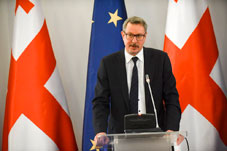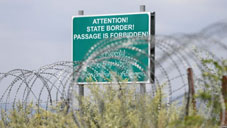
EU Ambassador Hartzell calls for reopening of all crossing points at the occupation line
By Nika Gamtsemlidze
Monday, September 6
The Ambassador of the EU to Georgia, Carl Hartzell, issued a special statement yesterday, on September 5, regarding the two-year anniversary of the closing of the Odzisi crossing point at the South Ossetian Administrative Boundary Line, ABL.
Before the official closure of the occupation line, as many as 400 crossings used to take place on a daily basis on average. According to the statement of the EU Ambassador, for over two years, ethnic Georgian residents living in the Akhalgori District were unable to cross the so-called border and meet their relatives. People living in the occupied region were also unable to collect their pensions or exercise other basic human rights, including education in their native language, Georgian.
The statement also reads that people living in Akhalgori District were unable to access medical care. Many reports regarding shortages of food and medicine were present as well, which had created numerous problems locally.
The statement of the EU Ambassador Hartzell also reads that the recent developments and steps taken towards easing procedures about regulating medical crossing from the Akhalgori District have been welcomed by the EU representatives in Georgia.
According to the statement, it is very important to adopt a sensible as well as adequate Covid-19 testing strategy to further increase the freedom of movement between the occupied region and Georgian-controlled territory.
The statement also called on the de facto authorities in Tskhinvali and the Russian Federation to allow for the reopening of all crossing points at the South Ossetian ABL to support the basic human rights of the local population in the region.
The EU Monitoring Mission is ready to support further negotiations and discussions within the framework of the Ergneti IPRM, according to the statement.
The two-year-long closure of the Administrative Boundary Line has created numerous problems for the local population of the occupied regions. Because of this, many were not able to leave the region for over two years now.


